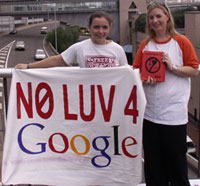Censorship protestors target Google's Sydney HQ

In fact, the protesters said they planned to end their relationship with the search heavyweight.
The protestors, who stood outside Google's Sydney offices at Darling Harbour in the central business district, handed out leaflets outlining why they were "breaking up with Google" over the company's China moves. They also held up a large sign announcing their position to motorists on nearby roads.
 |
| Click to enlarge |
"I used to love Google. I loved to Google things as much as everyone else," one of the protestors, Zoe Bedford, told ZDNet Australia. "But they've broken my heart and I have to tell them so."
"In Australia they act like they're all great and happy, and they've even got a slogan that says 'don't be evil'. And then in China it's a separate story."
The Australia-Tibet Council's small protest is part of a larger international campaign scheduled for today.
Google Australia took the comments from Bedford on the chin. "We understand some members of the Australian Tibet Council were outside the Google office today," a spokesperson said. "We respect their views and their right to protest.
"Our decision to launch Google.cn was a difficult one -- but we believe it was ultimately in the best interests of our Chinese users," he added.
Bedford said the argument that Google's decision to censor content in line with Chinese laws and regulations was a weak one.
"I think it's a bit unfair that they act in one state in one way and in another when they're an international, global sort of body," she said.
A second protestor, Katie Camarena, said Google had a choice in the way it acted in China.
"Basically they're bowing to the censorship laws, and spreading the propaganda," she said.
"They could make a choice. They could ... just go about their business as they would elsewhere, be true to their own ethos of 'don't be evil'."
"There's a lot of business people that won't do business with China, and there's a lot who will. And what we're saying to those who will is that we're going to be out here, telling people that you're doing it."
Bedford advised Australians to use alternative search engines, and inform Google of their disappointment over its China moves.
"If you've got a Google toolbar, and you take it down, Google asks you why, and you can just say: 'This is why, I don't agree with what you've done.'"
But Google isn't the only tech heavyweight that Bedford and her compatriots are disappointed with.
"There's quite a lot we don't like," said Bedford, mentioning Yahoo and Microsoft, which have both also come under fire recently for cooperating with Chinese authorities.
"We're targeting Google at this stage because they're the biggest and most well-known, and we think making an example of them might make a change for the other companies as well," she said.
Although the Sydney protest was extremely small, Bedford said some action had moved online.
"It's very much a Web-based campaign. A lot of people will be sending off e-mails and things today if they can't get to the action," she said.